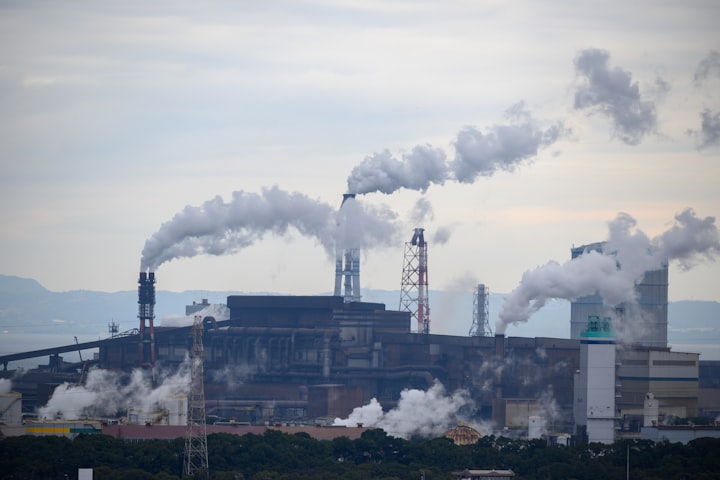What factor causes Environmental pollution
pollution

The most basic solution to air pollution comes from fossil fuels and replaces them with renewable energy, clean energy such as solar, geothermal, and wind. Switching to environmentally friendly modes of transport such as electric and hydrogen vehicles, promoting shared mobility, traffic congestion and public transport will also reduce air pollution. The world is working to reduce emissions of hazardous gas vehicles that in various ways cause air pollution such as emissions control, electric vehicles, and hybrid and public transport systems so that we can manage and reduce pollution in the future.
There are many sources of pollution, each with its own impact on the environment and the ecosystem. Many of the causes of pollution are chemical pollution of water and soil, improper management of agricultural practices, noise and minimal pollution from cities, and urban migration from human growth. This article discusses the causes and effects of various forms of pollution.
Studies have shown that the human impact of air pollution is a major public health problem, not only because of its role in climate change but also because exposure to air pollution increases morbidity and mortality.
High levels of air pollution can increase the risk of heart attack, shortness of breath, cough, respiratory problems and eye irritation, nose, and throat. Air pollution can also cause or exacerbate existing heart problems, asthma, and other lung problems. Excessive air pollution can cause health problems such as pollen and fungal infections associated with asthma and allergies.
Air pollution causes more environmental impact than its effects on humans and animals. As one of the leading causes of death in the world, air pollution causes more than seven million deaths each year. Humans and animals suffer from a host of health problems caused by air pollution, including birth defects, infertility, and disease.
The increasing amount of air pollution makes it difficult to breathe fresh, clean air. In and around cities and cities, car exhaust is a major cause of air pollution.
There are many environmental problems, including chemical pollution, air pollution, climate change, pathogens, health outbreaks, poor infrastructure, and poor water quality. Different chemicals affect human health in different ways, and exposure to external hazards can pose health risks. We have listed 10 common causes and effects of air pollution that can have a huge impact on your daily life.
Environmental impact indicators measure threats to the environment and the environment that has been damaged by pollution. When calculating moderate pollution, these indicators are measured in half, and CalEPA considers point indicators to be a direct measure of exposure to air pollution during air pollution monitoring. Indicators of exposure points contribute significantly to a person's burden of pollution because the effects of living near a polluted land or water are much faster.
These indicators are highly sensitive to socio-economic factors, including biological factors, age, the health status of tractor builders, and factors related to SE tractor levels (e.g. poverty and education), which increase the risk of harmful health outcomes.
In other words, pollution occurs when toxins, contaminants, or other harmful products enter the environment and disrupt their normal patterns and functions. Natural pollution is a result of natural phenomena.
Pollution refers to the release of chemicals, particles, and organisms that are harmful to humans, plants, and animals or that harm the environment. Some causes of pollution are natural, such as sudden changes in temperature or certain seasonal changes in the normal cycle, and others are the result of human influence.
More than ever before, the impact of air pollution as a result of human activities on our planet is far more significant for engineers, planners, and environmental organizations, because of their long-term impact. Ever since man donated animal power to travel, pollution has increased. In industry, pollution caused by transportation is often caused by fossil fuels.
Climate change has increased the production of allergenic air pollutants, including fungi, due to humid climates, increased pollen floods, longer pollen periods, and higher pollen production.
Smog, or ozone depletion, is also the result of the depletion of the atmosphere by sunlight. Solid or liquid particles floating in the air come from cars and trucks, factory dust, pollen, mold particles, volcanoes, and forest fires. Ozone depletion occurs when sunlight responds to certain chemicals from fossil fuels, such as gas and a car exhaust plant.
These particles absorb air and form chemical reactions with air or aerosols. Solid and liquid particles, as well as certain gases that float in the air, are not good for the planet and our health, so it is important to look at them.
These types can cause direct damage to humans, but particles can also come from indoor air pollution (see cooking, traditional chocolate, and metal industries such as bangle making).
Indoor air quality is a major health problem in a state where Missourians spend an average of 90 percent of their time indoors. The use of household chemicals such as bleach without better ventilation is one of the most common sources of indoor air pollution. Smog is a problem caused by automotive pollution, in which hydrocarbons released from engines cause the formation of low-level ozone, which is harmful to humans.
Earlier this month, the United Nations Intergovernmental Panel on Climate Change warned that coal-fired power generation should end by 2050 if we want to reduce global warming to 1.5 degrees. The NRDC has been a leader under the Clean Air Act since its inception in 1970. The law allows the U.S. Environmental Protection Agency (EPA) to protect public health by regulating the emission of harmful pollutants.
About the Creator
Radha Karki
I am very curious ar learning new things, love to read books, paintings, art, and love singing too.





Comments
There are no comments for this story
Be the first to respond and start the conversation.